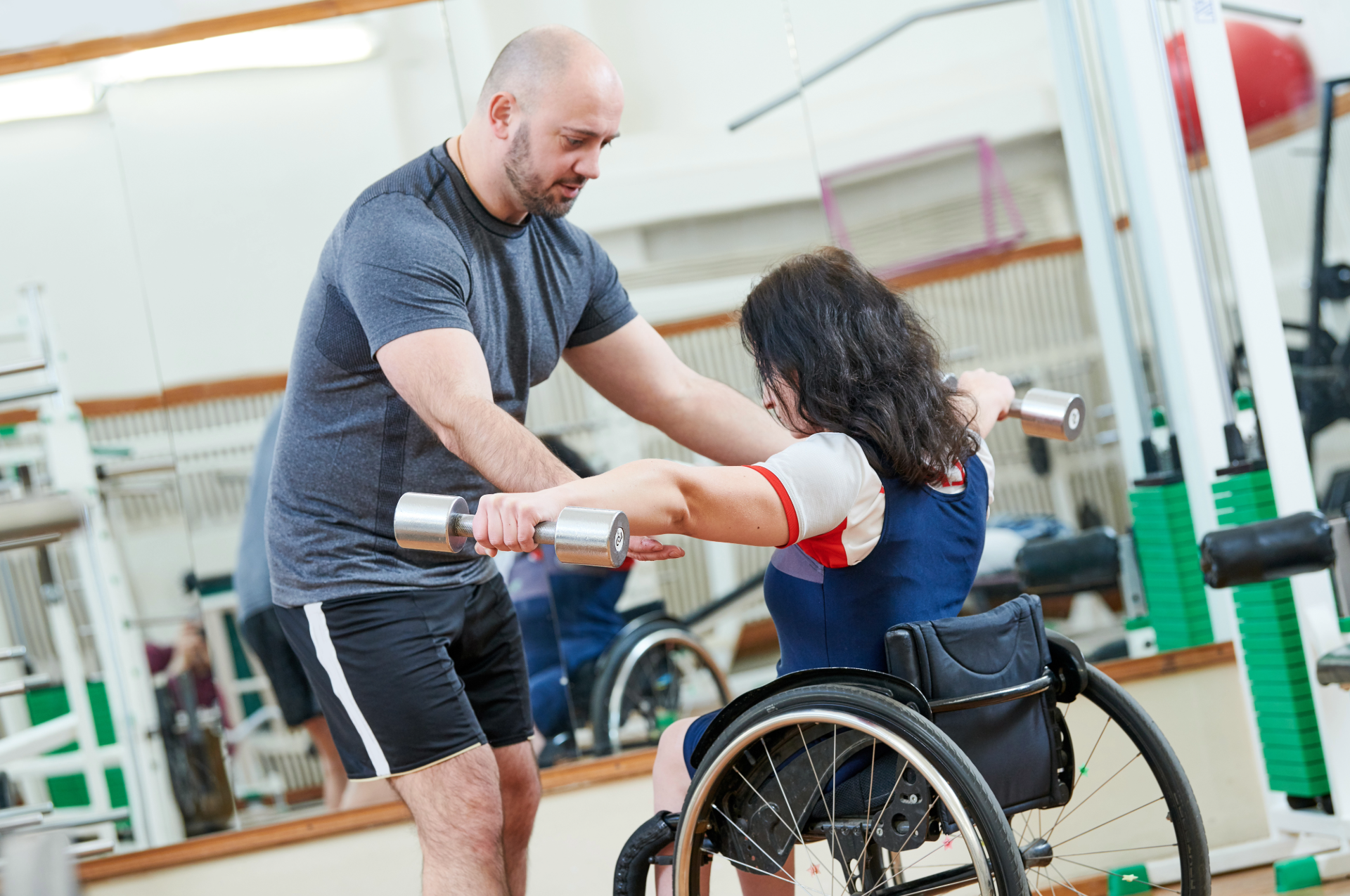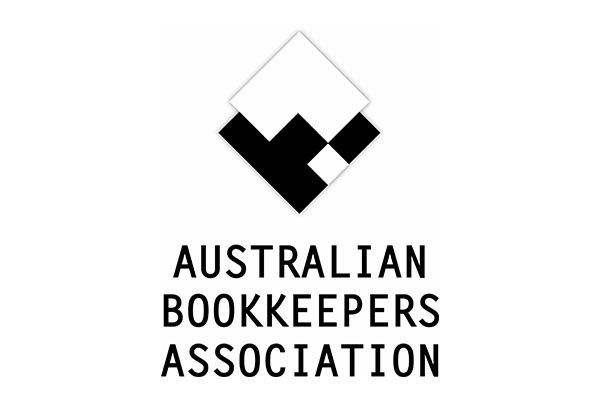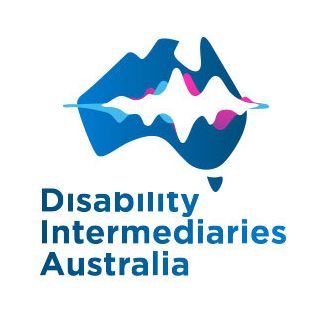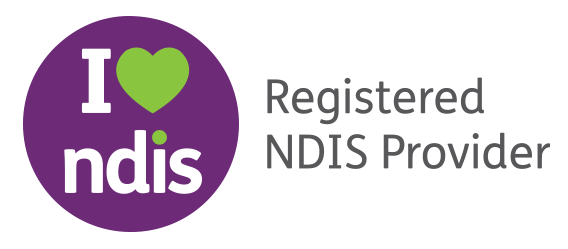Participant Enquiries
When Should You Start Preparing for Your Next NDIS Planning Meeting?

Your NDIS planning meeting is a key milestone in your journey with the NDIS.
It’s your opportunity to review your progress, update your goals, and plan the supports you need for the next stage of your life.
Good preparation can make a real difference — and it’s never too early to start.
When Should You Start Preparing?
Ideally, you should start preparing three to six months before your plan is due to end or be reviewed.
Starting early gives you enough time to:
- Gather updated reports and assessments
- Reflect on your current supports
- Identify new needs, goals, or changes
- Organise quotes if you require new services or equipment
If you leave preparation too late, you may miss important information that could affect your funding or delay necessary changes.
Timeline: Preparing for Your NDIS Planning Meeting
3–6 Months Before Your Plan Ends
- Review your current supports and goals
- Gather updated therapy reports and progress summaries
- Reflect on areas where you want to grow or change
- Start thinking about your new goals for the next plan
6–8 Weeks Before the Meeting
- Identify important changes or updates to share
- Arrange any necessary assessments or new quotes
- Discuss preparation with your Support Coordinator or LAC if you have one
4–6 Weeks Before the Meeting
- Prepare your list of questions and key points
- Organise who you would like to bring to your meeting (family, friend, advocate)
- Finalise personal notes about your daily activities and future goals
2–4 Weeks Before the Meeting
- Confirm the meeting date, time, and format (phone or face-to-face)
- Ensure all reports, letters, and documents are ready
- Set up your myGov details if required
1–2 Weeks Before the Meeting
- Confirm attendance for yourself and any support people
- Review your goals, notes, and questions
- Feel confident — your meeting is your opportunity to shape your future supports!
Key Signs It's Time to Start Preparing
You should begin preparing if:
- You have
three to six months left on your current plan
- The
NDIA has scheduled your plan review
- You have experienced a
change in your support needs (for example, starting work, health changes, or moving house)
- Your Support Coordinator, Local Area Coordinator (LAC), or trusted provider recommends reviewing your goals and supports
What Should You Start Preparing?
1. Review Your Current Plan
Reflect on:
- Which supports have worked well?
- Are there services or funding you haven’t used?
- Are there areas where you need more or different support?
2. Reflect on Your Goals
Consider:
- Have you achieved your current goals?
- Are there new goals you want to pursue?
- Have your needs changed since your last plan?
Your NDIS funding is closely linked to your goals, so it’s essential they are kept up to date.
3. Gather Evidence and Reports
Strong evidence supports funding requests.
Collect:
- Therapy progress reports
- Provider service summaries
- Quotes for new supports, assistive technology, or services
- Letters of support highlighting any new or evolving needs
In here we will have something like this - the resource information is below
Free Download: NDIS Planning Meeting Preparation Checklist
Preparing for your NDIS planning meeting? Our free checklist helps you track important reports, know who to request them from, and stay organised with easy tick-boxes for each document.
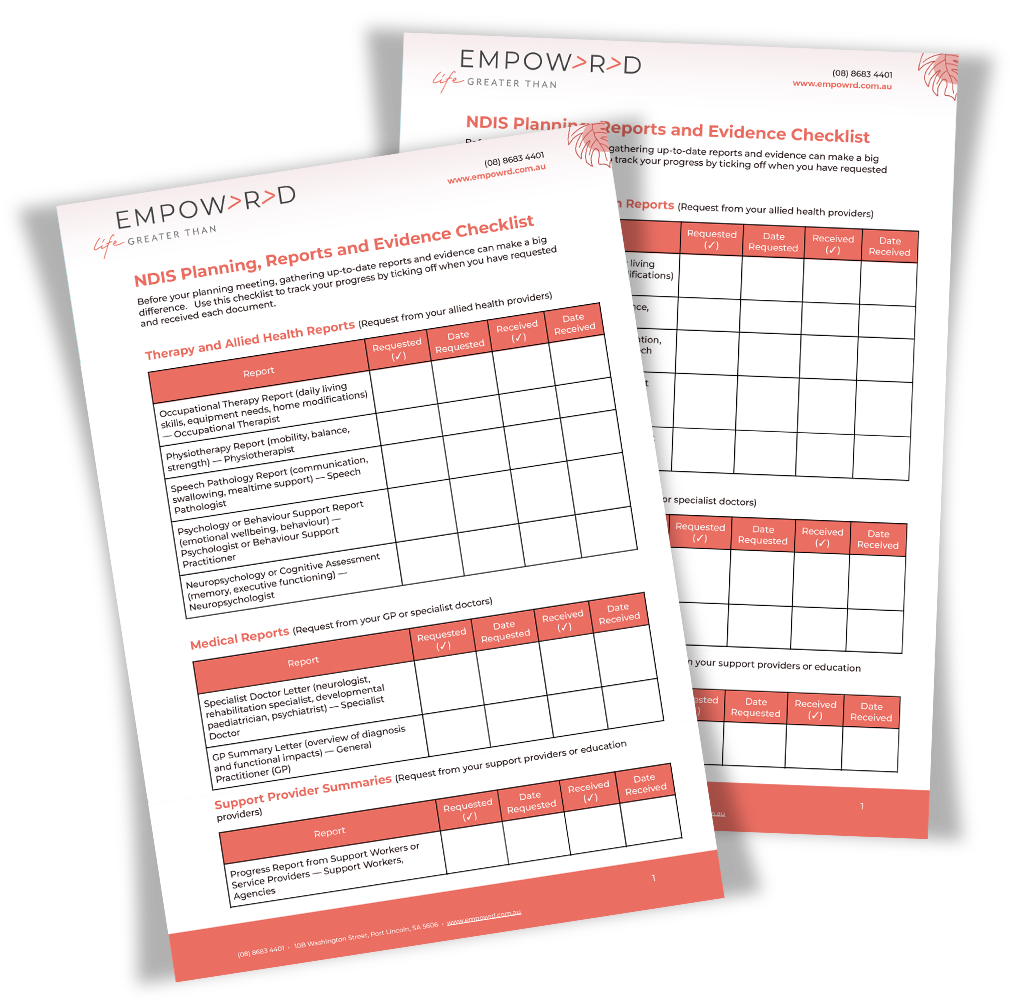
4. Identify Changes You Want to Request
Think about changes such as:
- Increased therapy sessions
- New equipment or technology
- More support for education, employment, or independent living
5. Prepare to Communicate Your Needs
Practice explaining:
- How your current supports have helped you
- What challenges you still face
- What you want to achieve next
Being confident and clear will help ensure your plan aligns with your needs.
Download the NDIS 'Creating Your NDIS Plan' Booklet
To assist with your preparation, the NDIS provides a useful booklet: Creating your NDIS plan – Booklet 2 of 3.
This official booklet includes:
- Guidance on thinking about your current supports and future goals
- Space to write notes, questions, and information you want to share
- Examples of what you might want to bring to your planning meeting
Download the PDF version here:
Using this resource can help you feel more organised, confident, and ready for your planning meeting.
What to Bring to Your Planning Meeting
To make the most of your planning meeting, bring:
- Any letters or correspondence from the NDIA
- Your bank account details (if considering self-managing some or all of your funding)
- Your myGov login and password (for online linking if needed)
- Updated reports, assessments, and quotes
- A list of questions you want to ask during the meeting
- Notes about your daily life, goals, and supports
You can also bring a family member, friend, advocate, or trusted support person.
If you need help arranging an advocate, speak to your early childhood partner, LAC, or NDIA planner ahead of time.
What to Expect at Your NDIS Planning Meeting
At your meeting, you will discuss:
- How your current supports are working
- Any updated or new goals
- New supports or services you are requesting
- Your daily living situation, community participation, and safety needs
Important:
- Your meeting will be conversational but is critical for setting up your funding for the next year or two.
- You can ask for anything to be repeated or explained if needed.
Preparing for a Phone Planning Meeting
Many planning meetings are now held over the phone.
Before Your Phone Planning Meeting:
- Know when your appointment is scheduled and who will call
- Find a quiet place with good reception
- Charge your phone and keep it accessible
- Have your documents and notes ready
- Arrange for your support person to join you if needed
During Your Phone Planning Meeting:
- It’s okay to ask for clarification or repetition
- Be ready to answer proof of identity questions
- Take notes and ask any questions you have
After Your Phone Planning Meeting:
- If you forgot to mention something important, you can contact your Planner or LAC later.
What Questions Will They Ask?
You may be asked about:
- Your personal details (living situation, family support)
- How you manage everyday activities
- Your mobility, safety, accommodation, and equipment needs
- Your informal supports
- The goals you want to pursue
- How you want your funding to be managed
- The types of support you think you will need
The information you provide also helps the NDIA improve services for all participants.
Understanding Goals and Why They Matter
Goals are the things you want to pursue or achieve.
They might include:
- Building independence
- Studying or starting work
- Joining social, sport, or recreational activities
- Building stronger relationships with family or friends
Why goals are important:
- Goals guide the types of supports funded (but they do not guarantee specific funding).
- Setting goals highlights your strengths, future focus, and motivation.
- Goals should be written in your own words — with help from a Planner or LAC if needed.
Tip:
Small steps matter. Setting both short- and long-term goals is encouraged!
What Happens if the Participant is Under 18?
If the participant is a child or young person under 18:
- A parent, guardian, or legally appointed representative will attend on their behalf.
- The focus remains on the participant’s needs, goals, and future aspirations.
- Young people are encouraged to contribute their views where possible.
What Happens After the Planning Meeting?
Once your meeting is complete:
- Your plan will be finalised and approved by the NDIA
- You will receive information on how to start using your supports
- Your Support Coordinator, LAC, or early childhood partner will contact you to assist
- If you are self-managing your funding, the NDIA will discuss your responsibilities
Important Notes: Mobility Allowance and Continence Aids Payment Scheme
When your NDIS plan is approved:
- Mobility Allowance: You must advise Centrelink within 14 days to avoid overpayment.
- Continence Aids Payment Scheme: Your plan may now fund continence-related supports through NDIS funding.
If you hold a Health Care Card, it remains unchanged.
Final Tips for a Successful Planning Meeting
- Start early: Begin preparation three to six months ahead.
- Stay organised: Keep reports, quotes, and notes together.
- Be clear and confident: Know what’s working and where you need change.
- Bring support: Don’t do it alone if you don’t have to!
Good preparation gives you the best chance to create a plan that truly supports your goals and independence.
Need Help Preparing for Your NDIS Planning Meeting?
At Empowrd, we provide Support Coordination services to NDIS participants across the Eyre Peninsula.
- If you are receiving
NDIS Support Coordination
in Eyre Peninsula through Empowrd, we can assist you in preparing for your planning meeting, including gathering reports, updating goals, and supporting you through the review process.
- If you are not currently accessing Support Coordination, we recommend contacting your existing Support Coordinator (if you have one funded) or seeking advice from an independent advocate.
With the right preparation and support, you can approach your planning meeting more confidently and clearly.
To find out more about Support Coordination services with Empowrd, call (08) 8683 4401 or visit our website.
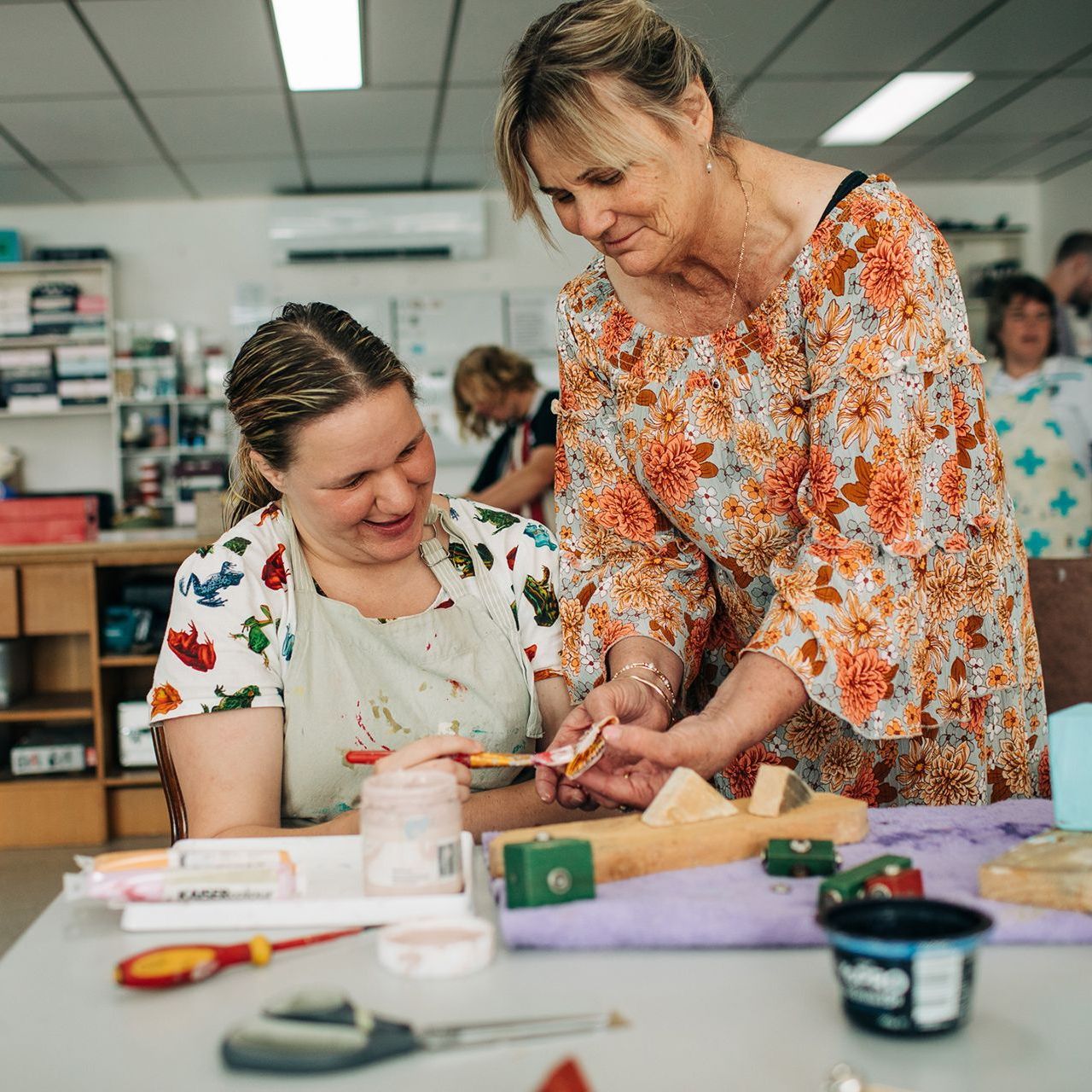
NDIS Plan Management and Support Coordination
At Empowrd, we are here to make your life easier. Based in Port Lincoln on the Eyre Peninsula, we offer a personal, accessible and holistic approach to NDIS Plan Management and Support Coordination.
We provide Plan Management services across Australia, assisting with financial administration, and offer Support Coordination to participants in Port Lincoln and Eyre Peninsula, connecting them with the right supports and providers. Our goal is to ensure your NDIS plan works for you, so you can focus on achieving your goals and doing what you love.
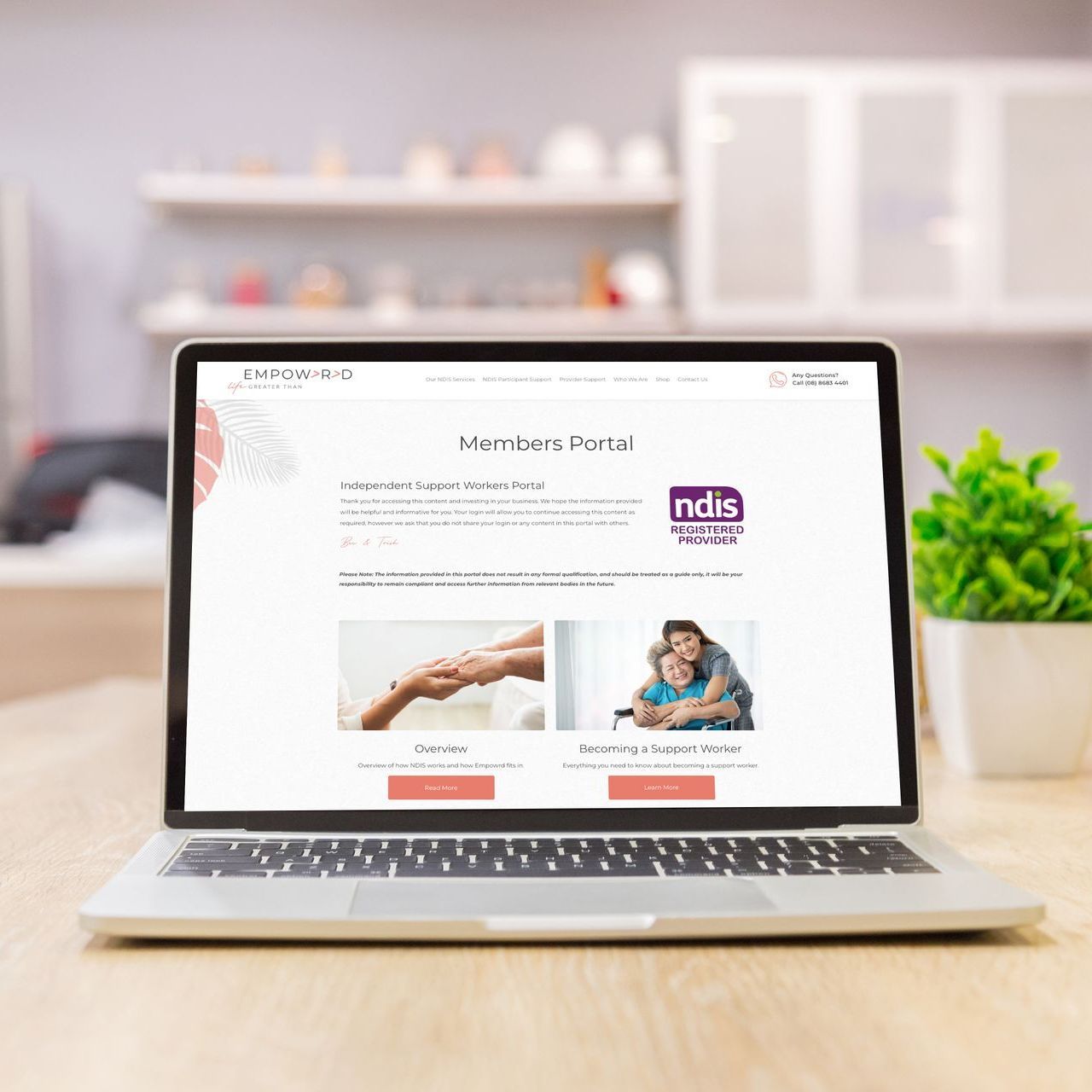
Want to Become a Support Worker?
Our Independent Support Workers Education Portal provides everything you need to navigate the NDIS, find work, and confidently offer services as an Independent Support Worker. For just $65, you will gain access to comprehensive guides, essential resources, and ready-to-use templates to streamline your work.
Inside, you will find:
- A clear breakdown of how the NDIS works
- Tips for finding jobs and delivering services
- Step-by-step guidance on invoicing and support planning
- Ready-to-edit templates for quotes, service agreements, invoices, and case notes
Need just the templates? You can also purchase them separately as standalone resources.
I hope you enjoy reading this blog post.
If you are ready to be Empowrd to live your life to the fullest, let us steer you on the right path.
Be EMPOWRD to Live Your Best Life
If you’re ready to be empowered to live life on your terms, we’re here to help guide the way. At Empowrd, we offer a personal, accessible, and holistic approach to NDIS Plan Management and Support Coordination. We’ll ensure your plan works for you, allowing you to focus on your goals and the things you love most.





